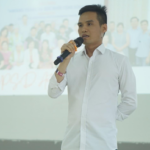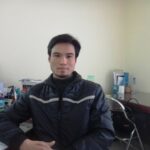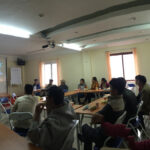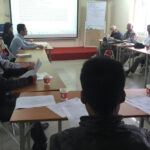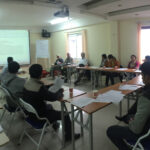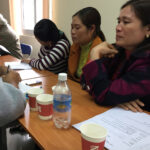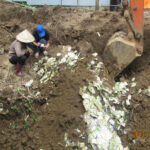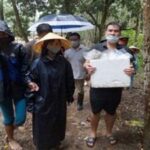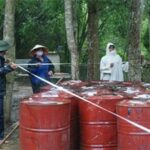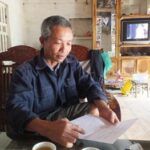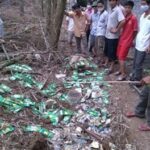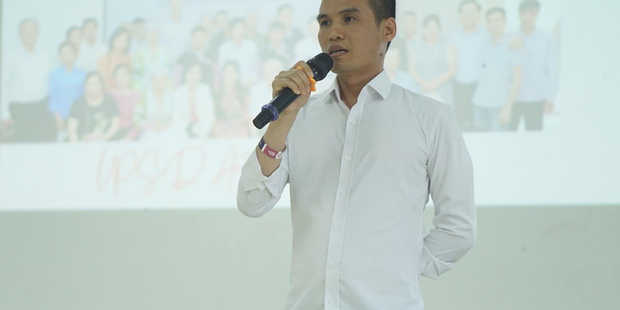
Dang Dinh Bach : a splendid example of community solidarity and a sad tale of injustice waiting to be redressed in Vietnam
Dang Dinh Bach is the former director of the Law and Policy of Sustainable Development Research Center (LPSD), an institute he cofounded in 2007 to actively contribute to sustainable development in Vietnam. Based in Hanoi, LPSD worked closely with the government, researching and analyzing legal and policy issues. In 2011, Bach— who had gained relevant experience as part of the Mekong Legal Network— became LPSD director and proceeded to transform it into the first public interest legal organization in Vietnam. As such, LPSD assisted many vulnerable communities to understand and enforce their rights in the context of environmental harm caused by industrial and development projects. This could be done by taking advantage of the country’s relatively strong environmental laws, policies, and procedures. A strong focus for Bach and LPSD was the direct engagement of communities in their work.
Challenging conventional patterns of economic development and their scarce consideration of the impacts on local communities and the environment made the work of LPSD both necessary and highly demanding. In many countries, communities facing impacts on their health, livelihoods, housing, and local environment have limited power to influence government plans and ensure corporate accountability. Public interest legal approaches are one of the few avenues they can try. Bach did all he could to help, working with existing laws, and engaging constructively with all stakeholders to seek at least some political recognition of community rights.
It is a fact, however, that lack of legal awareness, corruption, and limited space for action by civil society do often combine to prevent the implementation of environmental protection legislation. Because of this, Bach’s work required a long and patient approach. Complex environmental and land-related cases often meant confronting powerful economic and political interests, and Bach set up to build the awareness and capacities of both the communities and his legal colleagues, while constructively engaging with many concerned others. LPSD helped communities to negotiate with business, government, and in courts. It promoted public interest legal tools, building relationships with various levels of government (especially young mid-level officials). And it developed a public interest lawyers’ network that focused on pollution related cases. Slowly but surely, communities started to find their voice and understand some avenues for asserting their rights.
Among other initiatives, LPSD helped to convene and support an Action Group of Pollution Victims, providing legal and scientific advice and community strengthening. It was instrumental in developing a Vietnam Environmental Network (VEN), providing lawyers with relevant litigation models. And it helped local and international organizations to understand how best to use the legal environmental protection approaches that are available under Vietnam’s legislation. As LPSD was deeply committed to working with communities, it acted quietly and transparently, but without compromise in calling for authorities to implement Vietnam’s own environmental laws and policies, and possibly even improve them.
LPSD dealt with communities in simple language and spent significant time with them, which succeeded in building their trust, internal solidarity, awareness, and skills in advocacy and communication. Communities could thus submit petitions and connect with their local authorities, trying to convince them to involve the communities themselves and LPSD in their pollution investigations. Thus, through LPSD’s patient work, some local authorities started to understand their communities’ pressing issues and concerns. Intercommunity meetings were also organized, to exchange understanding, strategies, and problem-solving skills. Despite its chronic lack of funding to cover the demanding and complex work that communities requested, LPSD also recruited law students and helped many to gain a public interest perspective and experience.
Examples of long-term public interest cases taken up by Bach and LPSD include defending communities in the Nicotex Case, where tons of expired pesticides were illegally buried impacting local health, as well as in other cases where high levels of cancer in the community could be related to factory pollution. Bach’s leading role in the public interest Mekong Legal Network of EarthRights International included developing a grievance mechanism and land use impact assessment tool for communities in land disputes. As part of that work, LPSD trained many organizers to support their communities who had lost land and livelihoods due to displacement for the Son La dam. As a member of the regional Save the Mekong Coalition, Bach and LPSD helped raise awareness about the downstream impact of Mekong River dams on the communities, food systems and environment of the Mekong delta in Vietnam. In climate change work, they played a leading role in Vietnam Sustainable Energy Alliance, in particular during its seventeen days of action, in 2021, when the alliance questioned Vietnam’s heavy reliance on coal. Moreover, Bach was a member of the Executive Board of the VNGO-EVFTA Network– a group of development and environment organizations established to oversee the government’s compliance with labor and sustainability conditions in its trade agreement with the European Union (EU).
Was all this too much for some Vietnamese authorities? In June 2021, Bach was arrested on tax evasion charges and LPSD was forced to close. Bach is not alone. Over the past two years, four other environmental defenders and climate advocates have been arrested and imprisoned on similar charges. Human rights experts have expressed concern over a pattern in Vietnam of vague and arbitrarily enforced tax laws. Such laws can be easily weaponized to silence environmental defenders and those critical of government policy and its implementation. Following a judicial process in which he was denied due process and access to a fair trial, Bach received a 5-year sentence, one much harsher than is usual for those prosecuted for tax offences. As we write in 2023, Bach is in prison. The United Nations Working Group on Arbitrary Detention found that his detention is arbitrary and in violation of international law. The Special Rapporteurs on freedom of expression and association also noted that the tax laws used to imprison Bach and others are incompatible with the rights of political expression, speech, and association. Since Bach’s arrest, the United Nations has issued several findings on the pattern of persecution of environmental defenders in Vietnam. Bach’s apparent targeting demonstrates to many how important and impactful was the work that he and LPSD were carrying out. His ongoing detention is enormously concerning and makes it ever more important that Vietnamese authorities review the case and recognize the legitimate preoccupations that his case and other similar cases have created at both national and international level.
Ensuring that existing laws are legitimately and impartially implemented for the benefit of both the environment and vulnerable communities is a serious need, in Vietnam as in all other countries. The networks that LPSD supported inside and outside Vietnam continue their work, albeit in a very limited and constrained environment. Bach is trying his best not to despair and continues, so far unsuccessfully, to claim his innocence. In the summer of 2023, he engaged in a long hunger strike to call attention to the unfairness of the charges against him. In a message to his family, he sent his love to all species and people “beyond all differences in space, time, country, ethnicity and religion” and his hope that mankind will awaken “to preserve Mother Earth and protect freedom and life”. This is something he could “gladly give his life for”.
The 2023 Paul K. Feyerabend Award is offered to Bach to highlight his work as an example of community solidarity and in the hope that enlightened Vietnamese authorities will recognize that people like Bach and organizations like LPSD are a tremendous asset for any country. Only such people and organizations can help to develop the checks and balances and public awareness necessary for any country to prosper. And it is never too late to recognize and support their difficult and uncomfortable— but crucial— work. Because of its unique circumstances, this Award does not carry a financial envelope. But the sense of admiration and solidarity for Bach and LPSD are only multiplied. The Feyerabend Foundation remains hopeful that a positive review of his case will restitute Bach to his family and work, so critical for the future of Vietnam.
For more information, please see:
- http://www.standwithbach.org/
- http://www.youtube.com/watch?v=I6SXPSZBBE0&ab_channel=The88Project
- https://www.youtube.com/watch?v=kGsC7kLcX6k&t=8s&ab_channel=GlobalWitness
- TNLT Dang Dinh Bach Calls on Viet Nam to End Repression of Civil Society — Vietnamese (rfa.org)
- https://www.linkedin.com/company/lpsd?original_referer=https%3A%2F%2Fwww.google.com%2F
- https://www.washingtonpost.com/opinions/2023/04/23/vietnam-environmentalists-activistists-sentenced-prison/

